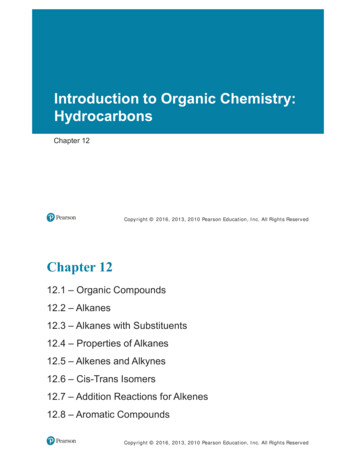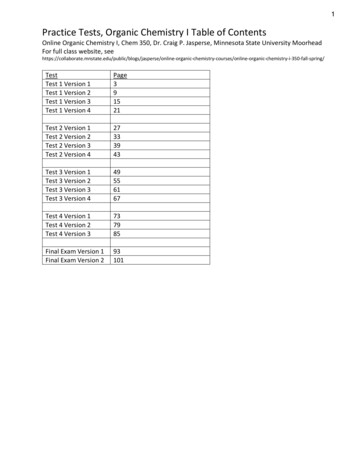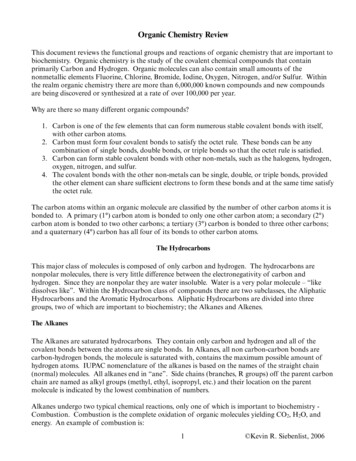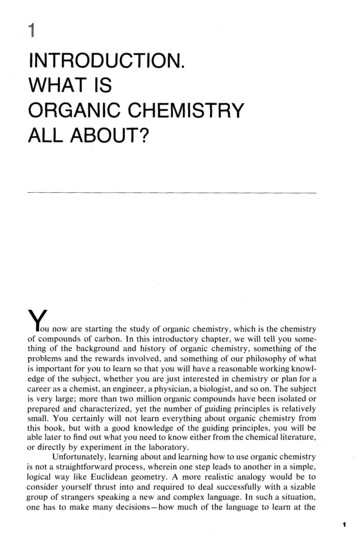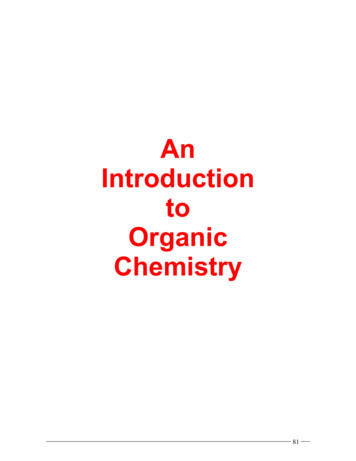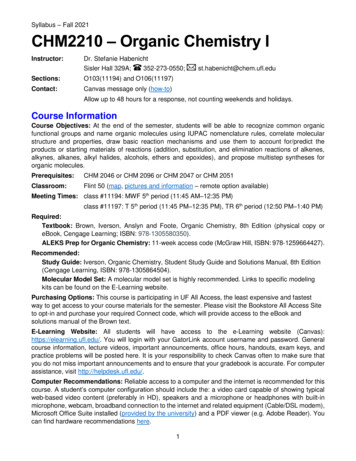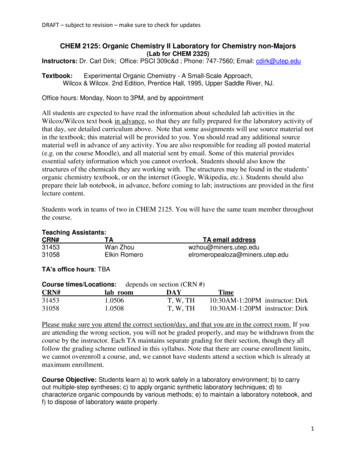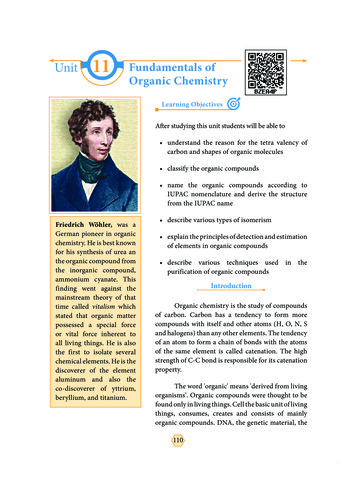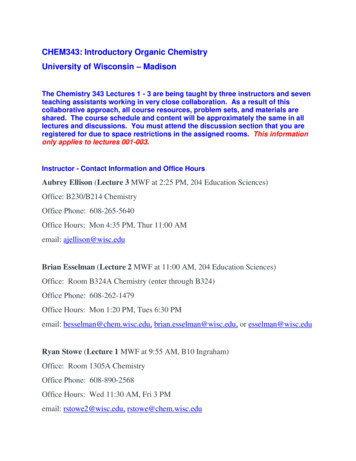
Transcription
CHEM343: Introductory Organic ChemistryUniversity of Wisconsin – MadisonThe Chemistry 343 Lectures 1 - 3 are being taught by three instructors and seventeaching assistants working in very close collaboration. As a result of thiscollaborative approach, all course resources, problem sets, and materials areshared. The course schedule and content will be approximately the same in alllectures and discussions. You must attend the discussion section that you areregistered for due to space restrictions in the assigned rooms. This informationonly applies to lectures 001-003.Instructor - Contact Information and Office HoursAubrey Ellison (Lecture 3 MWF at 2:25 PM, 204 Education Sciences)Office: B230/B214 ChemistryOffice Phone: 608-265-5640Office Hours: Mon 4:35 PM, Thur 11:00 AMemail: ajellison@wisc.eduBrian Esselman (Lecture 2 MWF at 11:00 AM, 204 Education Sciences)Office: Room B324A Chemistry (enter through B324)Office Phone: 608-262-1479Office Hours: Mon 1:20 PM, Tues 6:30 PMemail: besselman@chem.wisc.edu, brian.esselman@wisc.edu, or esselman@wisc.eduRyan Stowe (Lecture 1 MWF at 9:55 AM, B10 Ingraham)Office: Room 1305A ChemistryOffice Phone: 608-890-2568Office Hours: Wed 11:30 AM, Fri 3 PMemail: rstowe2@wisc.edu, rstowe@chem.wisc.edu
TA Office Hours: You are encouraged to attend the office hours of any/all of theorganic chemistry TAs, which are held in B317 Chem (Organic Chemistry TA OfficeHours Fall 2019). All of the TAs listed below are associated with Chem 343 lectures1 - 3 and are likely to know exactly what is going on in your organic course.Meghan Campbell (mecampbell2@wisc.edu) Thursday @ 1:20-2:25 PM; Friday @8:50-9:55 AMColleen Chernowsky (chernowsky@wisc.edu) Monday @ 2:30-3:30 PM; Friday @11:00 AM-12:00 PMKristine Golden (dlgolden@wisc.edu) Monday @ 9:55-11:00 AM; Wednesday @11:00 AM-12:05 PMAsif Habib (ahabib@wisc.edu) Wednesday @ 12:05-12:55 PM; Friday @ 12:05 PM12:55 PMAndrew Owen (aowen4@wisc.edu) Monday @ 1:20-2:10 PM; Monday @ 4:35 PM5:25 PMMarshall Padilla (mpadilla3@wisc.edu) Tuesday @ 1:20-2:10 PM; Friday @ 11:00AM-11:50 AMDan SantaLucia (santalucia@wisc.edu) Monday @ 11:00 AM-12:00 PM; Wednesday@ 3:30-4:30 PMChemistry 343 Official Course InformationOfficial Course Description: Chemistry 343 covers fundamental aspects of organicmolecular structure, including stereochemistry, and introduces basic themes in organicreactivity. It is the first semester of a two-semester organic chemistry sequence.Chemistry 345 is the second course in the sequence. Class is for students expecting totake two semesters of organic chemistry.Canvas Course URL: https://canvas.wisc.edu/courses/153145Course Designations: Intermediate level; physical science breadth; counts as L&ScreditRequisite: CHEM 104, 109, 116Chemistry 343 Learning Outcomes
Students will be able to use the electronic and molecular structure of organic moleculesto predict and rationalize their reactivity using concepts of bond strength,electronegativity, steric repulsion, strain, intermolecular interactions, hyperconjugation,conjugation, and aromaticity.Students will be able to use molecular orbitals, potential energy surfaces, and electronpushing reaction mechanisms to describe chemical reactivity with an emphasis on thereactions of alkenes, alkynes, alcohols, alkyl halides, and ethers.Students will be able to propose multi-step synthetic schemes to generate complexorganic molecules from simple starting materials using studied reactions.Chemistry 343 (3 credits) Credit Hour AccountingLearning in this course is structured in a blended and flipped model spread across manyplatforms. The numbers provided below are a good-faith estimate of the time needed tobe spent on this course in each component. The exact hours will vary from student tostudent.ActivityTime (hr)Lecture42Discussion15Video Lectures & ing and Learning Philosophy - EllisonKnowledge can be broken down into 4 categories. What you know you know, What youknow you don’t know, What you don’t know that you know, and What you don’t know thatyou don’t know. I believe that the most powerful of those categories is knowing what youdon’t know. It is only through recognizing what you don’t know that you take the first steps
toward learning. One of the best ways to accomplish this is to try to explain why you knowwhat you know. I highly encourage students to not be passive learners but to be teachersand thereby active learners.Being an active learner:Teach- Find a classmate/friend/pet/mirror and explain your thought process. As statedabove, teaching/explaining a concept allows you to reflect on your own understanding ofthe material. Be thorough in your discussion of the material and take note of any confusionso that you can address it later.Ask questions- While your in lecture or reading the textbook write down any questionsyou have about the material. This is a great way to engage with the material as it ispresented to you.Attempt to answer all questions- Beyond the problem sets and the discussionquestions, look to answer the questions that you pose yourself from lecture and the text.Before seeking the solution, attempt to answer the question yourself. It is okay not toknow the answer as the self reflection and identifying the gaps in knowledge are the truegoals of this exercise. This will help pinpoint where learning needs to occur.Review what you got wrong- Take time to review your quizzes and exams. Organicchemistry builds on itself. Taking the time to address and clarify what you don't know willfacilitate your future understanding of new course material.Being an active learner takes work and practice. Part of our role as instructors is to helpyou with this process. We as your instructors are always happy to listen to yourexplanations as it in turn helps guide our teaching. I hope that students that take my classare able to take away not only an understanding of the course material, but moreimportantly, develop their own approach to addressing problems that they can carry on intheir next adventure.Teaching and Learning Philosophy - Esselman"All real learnin' is painful." - Bob Clingan, West Bend West High SchoolThe above quote is from one of the best teachers I've had. I was very lucky to have himas my advanced chemistry teacher and was greeted by these words on the first day ofschool. I was a little intimidated, but I knew that I was going to love that class. He wasan old-school football coach, which shaped his outlook on teaching and learningchemistry. He knew that we needed to struggle with material to find out what we knewand what we didn't know. Without struggle, there is no clarification of what skills andknowledge have been mastered. Over the years, I have found a lot of truth in hisstatement. In challenging learning environments or courses that have high expectations,mastery of the material has required a lot of effort, a lot of toil, a lot of time, and a fairamount of pain.Learning is not free and is not easy. To move from familiarity to understanding andmastery, in organic chemistry, is going to require a great deal of focus and effort. Wepromise that by the end of chemistry 343/344/345, you will be a more mature learner, a
stronger thinker, and have a much better understanding of chemistry. To begin thatjourney you will likely need to improve in several areas:1) Time management and dedication - It is critical that you work very hard and veryefficiently to master the course concepts. First and second semester organic chemistrycovers more material and at a greater depth than you have likely encountered before thisstage in your education. Each concept and chapter builds upon the previous one. Youmust find a way to work at a consistently intense level for the entirety of the course. Thisis difficult. It will likely require you to develop greater intellectual and emotionalstamina. You will need to work on organic chemistry each and every day. You cannotafford to fall behind; it is very difficult to recover.2) Learning for Mastery - Most of the students entering organic chemistry are very, veryintelligent. Most of the students entering organic chemistry have been very successful inhigh school and their past college courses. Unfortunately, that means that most of youhave never been sufficiently challenged to develop the learning skills necessary to havesuccess in organic chemistry and beyond. As is the case in many areas of learning, thosewith poor learning and study skills don't even know that they lack good learningskills. One of the best things you could do for yourself is to continually push your mind tounderstand the underlying concepts. You should continually check to make sure that youcan answer all assigned course questions, explain the underlying concepts in writing andverbally, and to identify any areas where you have not mastered the course content.Like many of you, I did very well in high school and never learned how to study or learn. Ihad this naive notion that going to lecture and hearing someone explain material to mewould be sufficient; it was in high school. What I didn't understand is that high schoolcourses move at an incredibly slow pace compared to my University courses. During myfirst semester at UW-Madison, I got along okay, but I didn't have the success that I wasused to. I just thought that I wasn't as smart as those around me who were having moresuccess. I went into Math 222 in my second semester without really having figured outhow to study or to achieve mastery of learning. I did my homework and went to class soI assumed I was learning well enough to meet the course expectations. What I didn'tunderstand is that only being able to get some of the assigned problems correct withoutlooking them up was not the same as being able to solve all the assignedproblems. During the first midterm, I managed to solve 2 of the 10 integration problemsmy first pass through the exam. While getting really frustrated and uttering a few choicewords, I managed to solve one additional problem. I earned a 34 % when 56 % wasrequired just to get a D. I went through a really bad couple of days when I thought that Iwas going to have to drop out of school, become homeless, and live under a bridge. Ihad never failed so completely and I had no idea how to deal with it. Due to the right helpfrom the right people, I recovered emotionally and academically that term (Somehow, Imanaged a B in Math 222). The most important thing that I learned was that my successdepended on real learnin'. I needed to put in the time and fight with the material until Icould solve all of the problems all the time.Fast-forwarding a few semesters, I had honed my learning skills and commitment tomastery. When preparing for my Chem 561 exam, my friend Hudd and I completed every
single problem assigned during the semester 3 times. First, we completed every problemwhile consulting our notes and books and discussing the problems with each other. Then,we started again and completed each problem without books and notes, but discussingeach problem. The third pass through, we completed the problems in silence, swapped,and graded each other's work when done. The day of the exam we ran out of material towork on pretty early, so we played Madden Football and ordered a pizza. Then out ofguilt Hudd suggested that we do something relevant so we made up a few equationderivations and other problems that had never been assigned. We knew the material sowell, that we actually predicted one of the problems on the exam. Needless to say, Chem561 went better for me than Math 222.So, what changed? I had changed; I had grown. I had no longer accepted not knowing. Ino longer accepted mediocrity. I demanded mastery and was willing to do whatever wasnecessary to make that happen.3) Self-motivation - As an adult learner, you are responsible for your own learning andyour own motivation. If you are taking organic chemistry, it's almost certainly because itis important to your future. Learning this material and gaining the skills necessary tomaster it will be critically helpful to your future. As such, you should not expect someoneelse to provide you with the desire to learn, the desire to master, or the desire tosucceed. In order to put in the time and dedication necessary to achieve mastery of thecourse content, you will have to be very motivated. We can't motivate you. Your TAscannot motivate you. Motivation must come from within!Teaching and Learning Philosophy - StoweNobody thinks clearly, no matter what they pretend. Thinking's a dizzy business, amatter of catching as many of those foggy glimpses as you can and fitting them togetherthe best you can. That's why people hang on so tight to their opinions; because,compared to the haphazard way in which they're arrived at, even the goofiest opinionseems wonderfully clear, sane, and self‐evident. And if you let it get away from you,then you've got to dive back into that foggy muddle to wangle yourself out another totake its place. (Dashiell Hammett, quoted in diSessa, 1988)Learning is an active, messy business. When you try to figure out how somethingworks, you call up and connect all sorts of skills and ideas that you perceive might beuseful in crafting an explanation or model of the phenomenon in question. Building upand using an understanding of chemistry poses a challenge above and beyond mostinstances of “figuring out” in that most of the ideas and/or skills that seem like theyshould help explain the world (from our intuition) tend to lead us astray when mappedonto atoms and molecules. For example, the intuitive idea that more effort begets moreresult is handy when moving a heavy box but can be noticeably less helpful when tryingto explain differences in properties between two different substances (as the heaviermolecule does not necessarily have the higher boiling point). Atoms and moleculesbehave in weird, counterintuitive ways and research has shown that careful buildup isneeded to support students in weaving together coherent and useful understanding.That’s what we are trying to do here – give you explicit opportunities to connect topicsback to fundamental ideas (such as forces and energy) as you grapple with explaining
and modeling more and more complex systems. You need to engage with theseopportunities to be successful in this course. As you think through lecture material,engage in discussion sections, or approach problems, constantly be asking why aparticular process might or might not occur in terms of forces and energy. We are notafter pattern recognition or trivia – we are after robust, flexible, useful command ofdisciplinary core ideas. The ways of thinking that will help you construct and use aknowledge framework in organic chemistry are broadly useful to engaging in society asa scientifically literate citizen and will help with a wide variety of careers.Where the Learnin' HappensLectureThe purpose of lecture is to provide a conceptual framework for you to understand thecourse material. Key concepts and examples will be highlighted. While many details willbe discussed, the focus will be on the big concepts and how the current material connectsto past learning and future expectations. Lectures will help define the depth and breadthof the course and will help you understand the course expectations. You cannot learneverything necessary for success in the course from these lectures alone. Lectures willonly build the foundation of learning.Each lecture will be recorded and the lecture notes and video posted. Please be patient;they will be posted as soon as is practical; these are large video files. Since there arevideos of each lecture from Fall 2018, feel free to view those videos in place of the Fall2019 lecture video if it is not posted as soon as you would like.Discussion MeetingsThe discussion sections with your TA are probably the second most critical as part of yourlearning process. The discussions play many roles all of which serve to deepen yourunderstanding of the course material. You will have a chance to talk to your TA andclassmates about problem solving strategies, difficult course concepts, and productiveways of building up and using knowledge of chemistry. Discussion provides a greatopportunity to talk about the material. Discussion sections will always involve group workof some form or another; you will not be passively listening to your TA talk aboutchemistry. Furthermore, your TA’s are highly successful organic chemists. This meansthat they can point out common issues that students struggle with and help you avoidthem. They can provide you with learning insights that worked for them and they can helpyou interpret the textbook and lecture materials in a fairly sophisticated manner. Get themost out of each discussion by showing up ready to work and ready to discuss the week'smaterial.Textbook ReadingIt is quite difficult for most students to understand the course material at the depth neededfor a high-level of success without reading the textbook. Loudon's organic textbook (6thedition) is a great book chosen for its clear explanation and great practice problems. Werecommend reading each chapter before or after each lecture, depending on yourpreference. A thorough reading of the textbook on any topic you are struggling with is
critical. The explanations and examples provided will be helpful to your mastery of thematerial. It will provide more depth and breadth to the course material than We canprovide in lecture and should not be over-looked as a valuable tool. We highlyrecommend working the in-text problems as you go.Quizzes/ExamsThe quizzes and exams are not just evaluation tools. These assessments (including thepractice ones from previous terms) are teaching tools. They will give you the opportunityto clarify what you know and don't know. Use them to identify weak areas in yourknowledge that you can address.Office HoursYour TAs and us are highly concerned about your learning. Unfortunately, there are 800 of you and we can't reach out to each of you individually and make sure that you arehaving the success that you are looking for. In the past, the most successful studentstook good advantage of office hours on a weekly basis. The office hour information forFall 2019 is posted on top of this page. You are encouraged to attend as often as youneed and see any TA and instructor. Set an expectation for yourself to come to eachmeeting with an instructor with a list of questions and clearly identified problems that theyneeded help solving.Email / PiazzaWe get a lot of emails, and we lose them in the inbox more often than we'd like. In orderto help bring your email to our attention, please include Chem 343 in the subject line ofall emails you send us. Email should be limited to logisticals, concerns about grades,requests for alternate office hours, or any non-content related course questions. Contentquestions should be directed to Piazza and not sent via email to either the TAs orus. Content questions received via email will be directed to Piazza. Piazza is a greatonline resource where you can post questions, post answers to other students' questions,and receive answers to your questions from the TAs and us. Please remember to be veryclear when wording your questions on Piazza. Pictures of structures from ChemDraw arevery helpful. Chemdraw is an expensive piece of chemistry software that you have freeaccess. It is a high-quality chemistry drawing program that you can download (see below)and it will allow you to draw structures to accompany your questions. Pictures or scannedimages are also okay on Piazza, but you will likely find Chemdraw easy to use to makehigh-quality organic chemistry drawings. Piazza can be accessed from within Canvas bythe link on the sidebar.Problem Sets, Textbook Practice Problems, Previous Quizzes/ExamsThe only way to make sure you are learning at the right depth and pace is to completethe practice problems available. If you cannot transfer what you know to new moleculesor new structures, it identifies a gap in your knowledge and understanding. Answer keysare provided to the problem sets and textbook, use these to check your learning. Answerkeys are intentionally not provided to some of the previous quizzes/exams. This is doneto encourage you to talk to your classmates and instructors about any answers that you
are unsure of and to work through problems that you can't simply look up the answer toand shortcut the thinking/learning process.ClassmatesNothing reveals productive and unproductive connections between ideas in organicchemistry better than trying to use what you know to predict, explain, or model aphenomenon using words or representations. If you are working with one or moreclassmates on a regular basis, both of you will benefit from the opportunity to talk aboutorganic chemistry. Helping others through material is a great way to take your ownlearning of a concept from superficial to mastery.TutorsThe Department of Chemistry maintains a list of private tutors available for hire. Althoughthe private tutors included on the list have been affiliated with the department in someway, we provide this list as a resource and cannot guarantee the quality of any individualprivate tutor. https://www.chem.wisc.edu/content/tutorsGrading and Grading PhilosophyChemistry 343 Grading - Fall 2019There are approximately 575 points available in this course. There are three 25 ptquizzes, three 100 pt exams, and one 200 point final. No points will be awarded for theproblem sets or attending class. No exams or quizzes will be dropped; you must takethem all at the regularly scheduled time unless you have a university course conflict. Thefinal letter grades based upon 575 course points will reflect the historic averages of Chem343 with a course GPA near 2.74. (see the example histogram below)25 pts.100 pts.25 pts.100 pts.25 pts.100 pts.00 pts.200 pts.Quiz 1 DiscussionExam 1Quiz 2 DiscussionExam 2Quiz 3 DiscussionExam 3Quiz 4 (Practice Only)Final ExamThere are NO planned makeup quizzes. You must attend your discussion class onthe dates of the quizzes. For exams which are held in the evenings, if you have aconflict with a regularly scheduled university course, we will offer an alternate
arrangement. You will be contacted approximately two weeks prior to each examto coordinate. Please do not email us prior to our course-wide email.Grading PhilosophyGrades are important to you, to us, and to the university. Thus, grade assignmentsmust reflect achievement and learning. How that is measured and what achievementlooks like are issues that are up for debate and are subject-dependent. We consider theexams and quizzes in this course to be reasonable markers of achievement andlearning. Certainly, there are better/alternate methods for assessing student learning,though none of which seem overly practical in a course that serves 200 - 350 studentsper fall/spring course and 100 in the summer term. The final exam counts for 200 of575 course points weighing it double the other exams or the quiz total. This favorsstudents who have improved in their understanding and preparation as the courseprogresses. We endeavor to write exams that challenge students at all levels of learningand provide a wide grade distribution. Our goal is to have no one be perfect on the entireexam, at least one student provide a perfect answer to each question, and everyonedemonstrate the learning that they have achieved. We will always try to separate thosethat are trying to memorize patterns or use mnemonic devices from those who understandthe content in terms of reactivity, structures, molecular orbitals, pKa's, etc.Every semester, we get a lot of emails about grades, many of them suggesting that abetter grade is desired than was assigned. Often these emails include a significantmisconception, in our opinion, about how grading is supposed to work. Grading in ourlecture of Chem 343 is not about any of the following and are not considered as rationalefor wanting/deserving a better grade than what you have earned:1.2.3.4.5.6.Effort/Hard workAttitude toward organic chemistryAttendance of office hours, lecture, or discussionHow much your TA or instructor like/dislike youNeeding a better grade for {insert school type here} school admissionsWanting to take a course for which Chem 343 are prerequisitesUnfortunately, instructors and students have helped create a general state of confusionabout how grades are assigned, generally. Setting a certain % grade for an A/B/C isentirely artificial and is based upon a few assumptions. Firstly, it assumes that allassignments are of equal difficulty and can be compared directly. This is certainly not thecase in this course as the mean and standard deviation vary significantly from assignmentto assignment. Secondly, it assumes that there is some universal standard (such as 80% B) that should be attained for a particular grade. Furthermore, without intervention itoften creates grade distributions in difficult classes with GPA's that are much lower thandesired or reasonable. This forces odd adjustments to be made to scores to makethem fit with the instructor's desired grade distribution. This seems artificial and doesn'thelp students gauge their performance in light of mysterious adjustments. (Often times,people misuse the word curve here to mean a positive adjustment in everyone's score.)
A much simpler approach is to allow the scores to fall where they do from assessment toassessment and to determine each grade relative to the mean in units of standarddeviation. This allows us to attempt to write the best exam that we possibly can in orderthat we elicit strong evidence of what you know and can do with that knowledge. This isan imperfect approach, but far more instructive than simply looking at raw scores or %scores without considering the mean and standard deviation. In order to do this, simplyuse the formula below and apply an actual (simple) curve.normalized score (your score - average score)/(standard deviation)If your score is 1, you rocked that assessment! If your score is near zero, you haveachieved an average grade on that assignment ( B in Chem 343). If you have a scoreof -1, your achievement is not where it needs to be. This information will be added to thetitle of each quiz or exam once the information is available. To put this in terms that mightfit better your expectation of A/AB/B/BC/C/D/F, see the rough breakdown below. Thisshows the grade breakdown in pretty colors from a previous chemistry 343 term. Thenumbers in parenthesis are the normalized grade breaks. Do not attempt to usepercentage scores to estimate your current or projected course grade.We did choose a wavelength scale (A red) rather than a frequency scale (A violet) forthe color coding which could be another subject for debate. The historic GPA and theGPA of this example section below is 2.74.
There are two times that we will consider deviating from this grading formula andthe historic GPA.1) A truly exceptional lecture section This is likely to be a fairly rare occurrence. Butif the TAs and us do a remarkable job of teaching and all of you do an amazing job oflearning and somehow students exceed our expectations based upon past experience,we'll shift the grades up a bit.2) An exceptional student performance This is a more frequent occurrence (1 to 2%of students per term). If a student demonstrates that their raw score does not reflect theirachievement, we will consider raising the student's grade by 1/2 a letter grade toacknowledge that achievement. This typically occurs when a student is not academicallywell-prepared for organic and struggles on exams 1 and 2, but shows a high amount ofgrowth and achieves mastery in the second half of the course. Here's what we look for: a bad outlier of an exam (a normalized score about one standard deviation less thanthe student's normalized average)a positive trend in exam performance (a positive slope of 0.4 std dev/examthroughout the course)a consistent trend of performance (a bad 1st or 2nd exam, not a bad 3rd or 4th exam)a good final exam performance (at least better than the exam performance)or a A for anyone scoring over 90 % on the final (happened twice for a student notalready getting an A, but we're waiting and cheering for it to happen many more times)Academic MisconductFolks, please don't cheat. Cheating is bad; cheating is sad.Dealing with academic misconduct is the most painful/sad/annoying part of ourjob. Historically in Chem 343/345, penalties have ranged from a zero on the relatedwork and a letter on file with the Dean of Students office to failure/removal from thecourse with larger UW Dean's office penalties. The TAs and us had to deal with severalcases of academic misconduct last year and it was pretty unpleasant and heartbreakingall around. Out of respect, for yourselves, each other, and your instructors pleasebehave in an appropriate manner with regards to all of the assessments.UW Dean of Students Office - Academic IntegrityFrom our experience, the two most common forms of academic misconduct in thiscourse are related to re-grades and sharing information about quizzes/exams. Here aresome general thoughts and suggestions on the topic. (no particular organization orforethought)1) Do not talk to people about the quiz or exam until after the key is posted.2) Do not turn in work or thoughts that aren't your own.
3) Looking at someone else's exam or notes you brought in or whatever duringquiz/exam is bad, very bad.4) If it feels like you might be doing something icky and dishonest; you may well be, trydoing something else instead.5) Do not change your answers on your exam and ask for a re-grade. You might thinkwe are stupid and we might be. but we're not that stupid.6) When you come to the exam or quiz, sit far enough away from anyone else and in
Official Course Description: Chemistry 343 covers fundamental aspects of organic molecular structure, including stereochemistry, and introduces basic themes in organic reactivity. It is the first semester of a two-semester organic chemistry sequence. Chemistry 345 is the second course in the sequence. Class is for students expecting to

